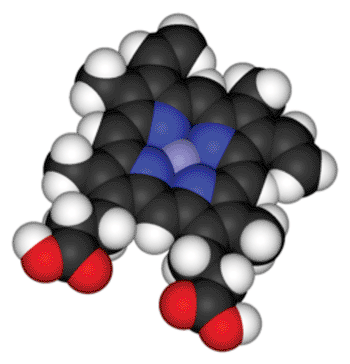New Anticancer Therapy to Target Cancer Cells' Elevated Need for Heme
By LabMedica International staff writers
Posted on 04 Jul 2013
Cancer cells have metabolic requirements that separate them from normal cells, and render them vulnerable to drugs that target these processes.Posted on 04 Jul 2013
A recent study aimed to identify bioenergetic alterations in lung cancer cells by directly measuring and comparing key metabolic activities in a pair of cell lines representing normal and non-small-cell lung cancer (NSCLC) cells developed from the same patient. Lung cancer is the leading cause of cancer-related mortality in the US and worldwide and about 85% of the cases are NSCLC.

Image: Space-filling model of heme (Photo courtesy of Wikimedia Commons).
Investigators at the University of Texas (Dallas, USA) worked with a pair of cell lines representing normal nonmalignant HBEC (HBEC30KT) and NSCLC (HCC4017) cells developed from the same patient. They compared the metabolic and molecular profiles of this matched pair of cell lines grown under identical conditions.
Results published in the May 21, 2013, online edition of the journal PLOS ONE revealed that the rates of oxygen consumption and heme biosynthesis were intensified in NSCLC cells. Additionally, the NSCLC cells exhibited substantially increased levels of an array of proteins promoting heme synthesis, uptake, and function. The levels of oxygen-utilizing hemoproteins, such as cytoglobin, were dramatically increased in the cancer cells.
Inhibition of heme with succinyl acetone, a chemical that prevents cells from synthesizing heme, suppressed oxygen consumption, cancer cell proliferation, colony formation, and migration.
"Cancer cells not only make significantly more heme, we also found they uptake more heme from the blood," said senior author Dr. Li Zhang, professor of molecular and cell biology at the University of Texas. "All cells need a certain level of heme, but our findings indicate that normal cells need much less heme compared to cancer cells. We think a high level of heme in cancer cells results in a lot more hemoproteins, which metabolize oxygen and produce more cellular energy. That then drives the cancer cells to proliferate, to migrate, and to form colonies."
"When you inhibit heme synthesis or deplete heme, it does not affect normal cells too much," said Dr. Zhang. "It selectively affects cancer cells. That is the beauty of our work. Because inhibiting heme effectively arrested the progression of lung cancer cells, our findings could positively impact research on lung cancer biology and therapeutics."
Related Links:
University of Texas













